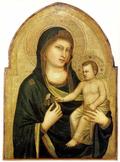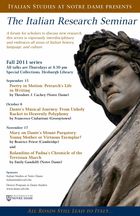The Italian Research Seminar
Graduate Research in Medieval Studies

"Mary on Dante’s Mount Purgatory: Young mother or virtuous exemplar?" by Beatrice Priest
Representations of Mary in the poetry, art, sermons and other textual genres contemporary with Dante’s Commedia focus heavily on her earthly role as mother and draw attention to the physical aspects of her maternity, especially her womb and breasts. In the Commedia, Mary makes her most consistently sustained appearance in Purgatory, the most ‘earthly’ of the three otherworldly realms, where she is represented on every terrace. We would therefore expect Mary to be represented here, not as Queen of Heaven as in the Empyrean, but as Mother of Christ. However, Mary’s physical role as mother is minimized and she appears instead as a virtuous exemplar. This paper explores the representation of Mary as an exemplar in Purgatorio X-XXVI and through a comparison with the Convivio postulates that Mary’s maternal fecundity is represented in an altogether different, subtle and innovative manner.
“Rolandino of Padua’s Chronicle of the Trevisian March,” by Emily Gandolfi

Rolandino of Padua’s Chronicle of the Trevisian March narrates the story of the tyrant Ezzelino da Romano, imperial agent of Frederick II in the Trevisian March. From 1226 until his capture and death in 1259, Ezzelino attempted to forcibly wrest political control from one independent commune after another, establishing himself or one of his allies as podestà and minimizing the roles of the formerly established ruling councils. As a notary in the Paduan commune and an active member of the council, Rolandino had a vested interest in composing a narrative that would juxtapose Ezzelino’s cruel and arbitrary tyranny with a consensus-based governing body. Using Rolandino’s chronicle as a case study, this paper will explore Rolandino’s presentation of the communal political system that Ezzelino was attempting to destroy and Rolandino was fighting to preserve.

Beatrice Priest is in the final year of her PhD on ‘Fecundity and Sterility in the work of Dante Alighieri’ at the University of Cambridge and works under the supervision of Professor Zygmunt Barański. She is at Notre Dame as a visiting exchange student where she is carrying out research on Dante’s depiction of the natural world and his poetics, and teaching an intensive Italian language course to undergraduates. Beatrice completed both her undergraduate and masters studies at the University of Cambridge, but has spend substantial time working and researching abroad in both France and Italy. Although her primary focus is currently medieval literature and art, Beatrice is also extremely interested in renaissance literature and art.
Emily Gandolfi is working to complete her graduate studies in the Medieval Institute at Notre Dame. Her dissertation examines the role of Italian notaries as participants in and historians of communal political life, with particular focus on Boncompagno da Signa’s Account of the Siege of Ancona, Rolandino of Padua’s Chronicle of the Trevisian March, and Albertino Mussato’s historical works.

The Italian Research Seminar, jointly organized by the Devers Program in Dante Studies and by Italian Studies at Notre Dame, aims to provide a regular forum for faculty, postdoctoral scholars, graduate students, and colleagues from other universities to present and discuss their current research. The Seminar is vigorously interdisciplinary, and embraces all areas of Italian history, language, and culture (from literature to film, from art history to music, and from anthropology to architecture), as well as perceptions of Italy, its achievements and its peoples in other national and international cultures. The Seminar constitutes an important element in the effort by Notre Dame’s community of Italianists to promote the study of Italy and to serve as a strategic point of contact for all Italianists.